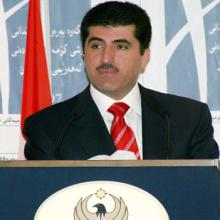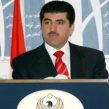Political Consensus Missing in Establishment of U.S. Military Bases in Iraqi Kurdistan
Publication: Terrorism Focus Volume: 5 Issue: 28
By:

Recent reports suggest that the United States may establish long-term military bases in Iraqi Kurdistan. According to the Gulf News, “U.S. forces could be stationed permanently in Kurdistan as part of a long-term security agreement, top Kurdish political sources revealed… The Iraqi government and head of northern Iraq’s regional Kurdish administration, Massoud Barzani, along with the leadership of U.S. forces in Iraq have started to suggest that American forces be permanently based in Kurdistan” (Gulf News, July 23).
The Kurdistan Regional Government (KRG) allocated 1,500 acres of land east of Halabja—a town less than 10 miles from the Iranian border—for the building of a major military airport, according to an Iranian PressTV report (July 17). The same report cited an unnamed official in the Kurdish administration who revealed that U.S. delegations have been visiting the region since 2003: “They were studying the roads leading to Iran, under the pretext of providing services to the town.” U.S. government spokespersons denied that the airport project near Halabja has any military dimension (VOA, July 18), although Kurdish sources cited in the PressTV report claimed that the size of the project and its American funding indicated “a large military base.”
The United States has been negotiating a “Status of Forces Agreement” (SOFA) with the Iraqi government, an agreement which would provide a legal framework for the continued operations and presence of U.S. troops in Iraq once the U.N. mandate for the Multinational Force in Iraq expires at the end of 2008. Among other things, the sensitive SOFA negotiations need to address the question of long-term bases in the country. Although the official U.S. military euphemism for permanent bases has shifted from “enduring bases” to “contingency operating bases,” the factors militating for and against the presence of such bases in Iraq remain the same.
In broad terms, the maintenance of more or less permanent bases in Iraq and Afghanistan forms a very important part of U.S. strategic policy, for “forward operating sites,” “cooperative security locations for rotational and contingency purposes,” and “strategically placed prepositioned equipment and forward command and control elements” [1]. Particularly with Iran and, to a lesser extent, Syria threatening U.S. policy, interests and allies in the region, such bases in Iraq remain crucial for U.S. military planners.
At the moment, all major U.S. military bases in Iraq lie outside the Kurdish Autonomous Region, with a heavier concentration in Sunni Arab areas of the country than in Shiite Arab regions. Since most of the U.S. facilities in Mosul were turned over to Iraqi control in July 2006, the U.S.-controlled airfield and base in Kirkuk remains the largest U.S. military facility close to the Kurdistan Region’s current borders. The presence of major U.S. bases in Sunni Arab areas is easily justified by the need to help the government of Iraq establish security in an unstable, post-Saddam context. The U.S. military presence in Arab parts of Iraq provokes resentment from many Sunni and Shiite Arabs, however, and may play into the anti-imperialist rhetoric of Iraqi and foreign insurgent groups. Bases located in less friendly territory are also more vulnerable to insurgent attacks, re-supply problems, sabotage or spying and exact a political price for the government hosting them.
The Kurdistan National Guard (peshmerga) continues to maintain a high level of stability and security in the Kurdish Autonomous Region, however, and the establishment of U.S. bases there would lack any domestic, anti-insurgency justification. Major U.S. bases in Kurdish Iraq would thus appear more obviously aimed at fulfilling longer-term U.S. strategic ambitions of maintaining a presence in Iraq. They may also be viewed as either an attempt to safeguard Iraqi Kurds, or threaten neighboring states, or both. Bases in friendly, mountainous Iraqi Kurdistan offer a number of obvious advantages for the United States, especially with Iran and Syria to the immediate east and west, respectively. Cooperative peshmerga forces could also serve as a force multiplier for such bases.
Kurdish leaders have never made a secret of their support for the possibility of long-term U.S. military bases in their autonomous region. Such an American military presence would provide a land-locked, very vulnerable Kurdistan with a strong implicit security guarantee vis-à-vis Arab Iraq, Iran, Syria, and even Turkey. It would also help ensure enduring U.S. engagement with and support for Iraqi Kurdish interests, including autonomy from Baghdad. In 1973, Iraqi Kurdish leader Mullah Mustafa Barzani went so far as to proclaim: “We can become your 51st state and provide you with oil” (Washington Post, August 1, 2003). Although Iraqi Kurds would likely remain dependent on U.S. security guarantees, such dependence would allow a corresponding amount of independence from Arab, Iranian and Turkish influence and manipulations.
The possibility of permanent bases in Iraqi Kurdistan, whether “enduring” or “contingency operating,” poses a number of worrisome implications and problems as well, however. To begin with, the Iraqi Permanent Constitution of 2005 clearly gives Baghdad authority over treaties with foreign states, which would include any Status of Forces Agreement with the United States. Jabar Al Yawir, spokesman for the Protection Forces of the Kurdistan Region, therefore made it clear that “a permanent U.S. military presence in the Kurdistan region is welcome and is necessary to defend Iraq from internal and external risks and is important to protect the region, but this presence must be within an Iraqi-Kurd-American agreement” (Gulf News, July 18). Hence the same political difficulties that prevent most politicians in Baghdad from agreeing to long-term U.S. bases in Iraq would bedevil an agreement to allow enduring U.S. bases in Iraqi Kurdistan, which, although autonomous, still remains a part of Iraq. Many Arabs in Iraq and the Middle East already suspect Iraqi Kurds of serving as a tool for “American (or Israeli) imperialism,” and a separate Kurdistan SOFA agreement for bases would play right into such accusations. The United States might also be accused of intending to aid Iraqi Kurdish plans to secede from Iraq.
The possibility of long-term American bases in Iraqi Kurdistan—or elsewhere in Iraq, for that matter—also provokes strident opposition from Iran and Syria. Both countries view such bases as launching pads for future attacks against them, or at the very least a useful tool for American saber-rattling in the area. Iraqi Prime Minister Nouri al-Maliki had to travel to Teheran in June to try to reassure Iran’s President Mahmoud Ahmadinejad about the SOFA negotiations, saying his government “will not allow Iraq to become a launching pad for an attack on its neighbor” (PUKMedia, June 8).
The continued presence of American troops in Iraqi Kurdistan would also have implications for U.S.-Turkish relations. Turkey maintains a number of small bases and outposts in Iraqi Kurdistan, and in 2003 Turkish Special Forces were detained, held and expelled by the U.S. military on two separate occasions. In the first instance, 12 Turkish commandos were detained by U.S. forces who accused them of using humanitarian aid convoys to Iraqi Turkmen as a cover for providing them arms, allegedly with a view to provoking a spiral of Turkmen-Kurdish violence that would justify a Turkish intervention in Iraqi Kurdistan. In the summer of 2003, the 173rd Airborne Brigade raided a Turkish safe-house in Sulaimaniya, detaining, hooding and interrogating another group of 12 Turkish Special Forces personnel, including a Turkish colonel and two majors. They were suspected of plotting to assassinate the Kurdish mayor of Kirkuk and plans of the mayor’s residence were supposedly found in their possession. The 12 were released after intensive Turkish diplomacy, although the incident sparked mass indignation in Turkey and seriously hurt U.S.-Turkish relations. Had Kurdish authorities treated the Turkish soldiers the same way, a Turkish invasion would have emerged as a distinct possibility. A continued U.S. presence in Iraqi Kurdistan might therefore have a threefold effect of limiting Turkish room for maneuver in the area, lessening the chances of a Turkish-Iraqi Kurdish confrontation, and increasing the likelihood of incidents that strain U.S.–Turkish relations.
In any case, reports about the construction of a large U.S. military airbase near Halabja or elsewhere in Iraqi Kurdistan remain speculative for the time being. Should the establishment of such bases figure in U.S. long-term planning for Iraq, one of the most difficult tasks will involve securing Baghdad’s acquiescence. More than a year ago, KRG President Massoud Barzani welcomed the establishment of such bases in his territory “on the proviso that there is consensus from the governments in Baghdad and Erbil.” Such a consensus will be difficult to attain.
Notes
1. “Strengthening U.S. Global Defense Posture,” United States Department of Defense Report to Congress, September 17, 2004.




